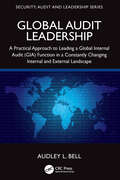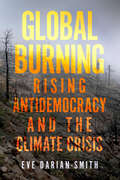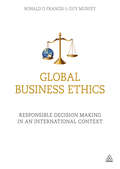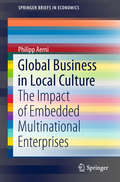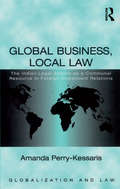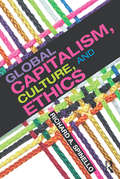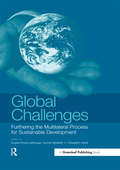- Table View
- List View
Global Audit Leadership: A Practical Approach to Leading a Global Internal Audit (GIA) Function in a Constantly Changing Internal and External Landscape (ISSN)
by Audley L. BellLeaders across the globe have a common challenge they cannot ignore: CHANGE. This must be embraced and effectively managed to remain relevant and successful in a dynamic operating environment. Embracing change, including technological innovations, collaboration, and timely sharing of information, is paramount to the survival and success of everyone in an ever-changing environment.In times of rapid change, organizations are often forced to adjust their strategic plans. Stakeholders usually need assistance to effectively manage the risks, unprecedented at times, and to capitalize on the opportunities that usually come with change. Change management must be effectively executed to assist in ensuring the viability of the organization.This book provides advice and guidance to assist stakeholders in navigating the challenges and demands of change. It includes insights, measures, and tools that have contributed to my success as a leader in the internal audit profession for 27 years.
Global Bioethics: Building on the Leopold Legacy
by Van Rensselaer PotterThis book on Bioethics discusses regarding the Leopold legacy, human survival, dilemmas in ecological Bioethics, two kinds of bioethics, dilemmas in medical bioethics, the control of human fertility and global bioethics defined. Appendix includes the Leopold heritage and a bioethical creed for individuals.
Global Bioethics: The Impact of the UNESCO International Bioethics Committee
by Jonathan D. Moreno Alireza Bagheri Stefano SempliciThe UNESCO International Bioethics Committee is an international body that sets standards in the field of bioethics. This collection represents the contributions of the IBC to global bioethics. The IBC is a body of 36 independent experts that follows progress in the life sciences and its applications in order to ensure respect for human dignity and freedom. Currently, some of the topics of the IBC contributions have been discussed in the bioethics literature, mostly journal articles. However, this is a unique contribution by the scholars who developed these universal declarations and reports. The contributors have not only provided a scholarly up to date discussion of their research topics, but as members of the IBC they have also discussed specific practical challenges in the development of such international documents. This book will be suited to academics within bioethics, health care policy and international law.
Global Boards
by Andrew Kakabadse Nada KakabadseProviding an insightful and challenging view of board functioning, governance application and top director interaction with business and the state. Scrutiny of board practice in countries as China, Russia, Turkey and Kazakhstan, establishes as many realities concerning governance and boards as there are nations, cultures, boards and directors.
Global Burning: Rising Antidemocracy and the Climate Crisis
by Eve Darian-SmithHow extreme-right antidemocratic governments around the world are prioritizing profits over citizens, stoking catastrophic wildfires, and accelerating global climate change. Recent years have seen out-of-control wildfires rage across remote Brazilian rainforests, densely populated California coastlines, and major cities in Australia. What connects these separate events is more than immediate devastation and human loss of life. In Global Burning, Eve Darian-Smith contends that using fire as a symbolic and literal thread connecting different places around the world allows us to better understand the parallel, and related, trends of the growth of authoritarian politics and climate crises and their interconnected global consequences. Darian-Smith looks deeply into each of these three cases of catastrophic wildfires and finds key similarities in all of them. As political leaders and big business work together in the pursuit of profits and power, anti-environmentalism has become an essential political tool enabling the rise of extreme right governments and energizing their populist supporters. These are the governments that deny climate science, reject environmental protection laws, and foster exclusionary worldviews that exacerbate climate injustice. The fires in Australia, Brazil and the United States demand acknowledgment of the global systems of inequality that undergird them, connecting the political erosion of liberal democracy with the corrosion of the environment. Darian-Smith argues that these wildfires are closely linked through capitalism, colonialism, industrialization, and resource extraction. In thinking through wildfires as environmental and political phenomenon, Global Burning challenges readers to confront the interlocking powers that are ensuring our future ecological collapse.
Global Business Environment: Industry 5.0 and Beyond
by Mansi KapoorThis book discusses the shifting paradigms in global business environment from the Fourth Industrial Revolution (Industry 4.0) to the Fifth Industrial Revolution (Industry 5.0). It captures the current shifts in the global environment for business caused mainly by the disruptive nature of rapid technological advancements and the consequences of globalisation, which impact political, social and economic changes.Divided into six sections—Political, Economic, Socio-Cultural, Technological, Ethical & Environmental, this book attempts to build perspectives on current trends sweeping globally across political, technological, socio-cultural and economic landscapes. Furnished with up-to-date examples and case studies, it presents an exhaustive yet lucid view of current socio-economic realities, the latest technological advancements, political undercurrents, and the issues and challenges confronting organisations and institutions both globally and locally. It is a compelling narrative based on ongoing years of deep research, cases, theoretical frameworks and insights that can help navigate what seems like an unimaginable future.This book will be useful to students, researchers and teachers of management, economics, liberal arts and related social sciences disciplines. It will also be a useful reference for those studying Public Policy and Law.
Global Business Ethics
by Guy Murfey Ronald D FrancisCorporate social responsibility, sustainability and acting ethically are all accepted business aims, but their meaning and implementation in a global context is far less clear-cut. Global Business Ethics cuts through the confusion to provide a coherent basis for ethical decision-making within the complications of the international business landscape. Underpinned by theory and including worked-through examples of ethical dilemmas and their solutions, this textbook will guide the reader beyond theory to real-world business decisions. Practical tools such as decision trees and suggested principles to apply in dilemma situations give readers the skills and confidence to tackle the ethical challenges they face. A unique working code of ethics is provided as a model with guidance to readers for adaptation and implementation. Case studies include: Walmart, Hershey's, Citibank, Ford, Nike, Johnson & Johnson, Harley- Davidson, The Body Shop and Procter and Gamble. A chapter on the legal aspects of ethics provides clear guidance on the complex relationship between law and ethics in international business. The final part takes an in-depth look at the practical application of ethics in business life. Covering all the major theories of ethics, including an examination of the role of quantification of ethics, Global Business Ethics demonstrates how their principles can be applied to inform better business decisions.
Global Business Regulation
by Peter Drahos John Braith WaiteAcross an amazing sweep of the critical areas of business regulation - from contract, intellectual property and corporations law, to trade, telecommunications, labour standards, drugs, food, transport and environment - this book confronts the question of how the regulation of business has shifted from national to global institutions. Based on interviews with 500 international leaders in business and government, this book examines the role played by global institutions such as the WTO, the OECD, IMF, Moody's and the World Bank, as well as various NGOs and significant individuals. The authors argue that effective and decent global regulation depends on the determination of individuals to engage with powerful agendas and decision-making bodies that would otherwise be dominated by concentrated economic interests. This book will become a standard reference for readers in business, law, politics and international relations.
Global Business in Local Culture: The Impact Of Embedded Multinational Enterprises (SpringerBriefs in Economics)
by Philipp AerniThis book examines the impact of multinational enterprises (MNEs) on local economies, and presents selected case studies of MNEs operating in low income countries. By balancing external social and environmental costs against its corresponding benefits, the book demonstrates that MNEs can have a positive net-impact on local development if they build up social capital by embedding themselves in local economies and engaging responsibly with local stakeholders. By doing so MNEs contribute to inclusive growth, a cental pillar of the UN Sustainable Development Goals. In this context, the book challenges popular narratives in civil society and academia that frame foreign direct investment (FDI) merely as a threat to human rights and sustainable development. Moreover, it offers practical guidance for globally operating businesses seeking to establish progressive Corporate Social Responsibility (CSR) strategies of their own.
Global Business, Local Law: The Indian Legal System as a Communal Resource in Foreign Investment Relations (Globalization And Law Ser.)
by Amanda Perry-KessarisThis volume establishes a theoretical framework for exploring the role of host state legal systems (courts and bureaucracies) in mediating relations between foreign investment, civil society and government actors. It then demonstrates the application of that framework in the context of the south Indian city of Bengaluru (formerly Bangalore). Drawing on the 'law-and-community' approach of Roger Cotterrell, the volume identifies three mechanisms through which law might, in theory, ensure that social relations are productive: by expressing any mutual trust which may hold actors together, by ensuring that actors participate fully in social life and by coordinating the differences that hold actors apart. Empirical data reveals that each of these legal mechanisms is at work in Bengaluru. However, their operation is limited and skewed by the extent to which actors use, abuse and/or avoid them. Furthermore, these legal mechanisms are being eroded as a direct result of the World Bank's 'investment climate' discourse, which privileges the interests and values of foreign investors over those of other actors.
Global Capitalism, Culture, and Ethics
by Richard A. SpinelloThis book seeks to deepen the reader’s understanding of the complex ethical and social disputes that corporations and managers face in an increasingly globalized world. It reviews the history and nature of global capitalism along with the role of the multinational within the global economy. Special attention is paid to emerging and frontier markets where there is economic potential but also major challenges due to institutional voids. Globalization is a constantly evolving field. In addition to exploring basic economic concepts and ethical frameworks, this second edition takes into account many new developments across different industries, ranging from "Big Tech" to "Big Pharma." It reviews some of the controversies that have affected those industries including bribery, censorship, the politics of computer networking, sweatshops, divestment, and the intensifying crisis of climate change. The book now includes short case studies to help spur creative reflection. Also, the revised content is highlighted in two new chapters – "Bribery and Corruption" and "Emerging and Frontier Markets." The book is ideal for use as a textbook on globalization, and specifically for courses that want to introduce a social responsibility or ethical component at both undergraduate and postgraduate levels.
Global Capitalism, Culture, and Ethics
by Richard SpinelloSelected as an Outstanding Academic Title by Choice Magazine in 2014! This book aims to deepen the student’s understanding of the complex ethical challenges that businesses face in an increasingly globalized world. As the world moves towards greater interdependence, it has been demonstrated that globalization is linked to economic growth. This raises a critical question: as a key player in fostering economic growth, how does the multinational corporation function as a moral agent? Global Capitalism, Culture, and Ethics offers a sophisticated analysis of theoretical ethical issues such as universalism versus pluralism; the connection between law and morality; the validity of a corporate social agenda; and the general parameters of moral responsibilities for multinational corporations. With these foundational issues addressed, the book proceeds to analyze a number of specific controversies such as the proper scope of political activism, disinvestment, environmental sustainability, and responsible sourcing from low wage countries. The analysis of globalization is not confined to a treatment of the moral obligations of multinational corporations, but also reviews the history of global capitalism, the interdependence between governments and multinational corporations, and the beneficial and harmful effects of globalization on social welfare. Weaving together themes from economics, history, philosophy, and law, this book allows the reader to appreciate globalization from multiple perspectives. Its theoretical cogency and uncompromising clarity make it a rewarding read for students interested in issues of ethics and globalization.
Global Challenges and the Law of the Sea
by Tore Henriksen Marta Chantal Ribeiro Fernando Loureiro BastosThis book analyses a selection of challenges in the implementation and application of the 1982 UN Convention on the Law of the Sea (UNCLOS), focusing on several areas: international organizations, fisheries, security, preserving marine biodiversity, dispute settlement, and interaction with other areas of international law. UNCLOS has been described as the Constitution for the Oceans. It sets out the fundamental rights, obligations and jurisdictions of States regarding the access to, uses and management of the oceans and seas and their resources. It balances States’ diverse and sometimes conflicting interests, such as conflicting uses of space, against navigational interests and the protection of the marine environment. UNCLOS is the first global treaty to include comprehensive obligations on the protection and preservation of the marine environment, including the conservation of living marine resources. These are often common or cross-border challenges, which can only be addressed through international cooperation. The book is divided into three thematic parts. The first concerns the role of international organizations in ocean governance. It includes twelve chapters covering a very diverse set of issues, both materially and geographically, that demonstrate the importance of coordinated actions on the part of multiple States for obtaining harmonized solutions regarding the pursuit of activities in maritime spaces (in connection with e.g. navigation, fisheries or maritime security). The second part concerns the relevance of dispute settlement mechanisms for understanding the international law of the sea and the international legal framework within which the actions of the great maritime powers take place. It is composed of three chapters, examining stakeholders’ role in dispute settlement, the position taken by China and the Russian Federation regarding international litigation in maritime spaces, and how the South China Sea Award may be relevant to the debate on the international legal concepts of rock and island. In turn, the third part addresses current discussions on the conservation and sustainable use of marine biological diversity of areas beyond national jurisdiction. Its seven chapters report on the status quo of the ongoing negotiations for a new international legal regime of the high seas, and the establishment and operationalization of environmental regimes for international maritime spaces.
Global Challenges for Innovation in Mining Industries (Intellectual Property, Innovation and Economic Development)
by David Humphreys Alica Daly Julio D. Raffo Giulia ValacchiPeople have been digging in the ground for useful minerals for thousands of years. Mineral materials are the foundation of modern industrial society. As the global population grows and standards of living in emerging and developing countries rises, the demand for mineral products is increasing. Mining ensures that we have an adequate supply of the raw materials to produce all the components of modern life, and at competitive prices. Innovation is central to meeting the diverse challenges faced by the mining industry. It is critical for developing techniques for finding new deposits of minerals, enabling us to recover increasing amounts of minerals from the ground in a cost-effective manner, and ensuring it this is done in a way that is as environmentally responsible. This book provides the first in-depth global analysis of the innovation ecosystem in the mining sector. This book is Open Access.
Global Challenges in Maritime Security: An Introduction (Advanced Sciences and Technologies for Security Applications)
by Lisa OttoFrom pirates to smugglers, migrants to hackers, from stolen fish to smuggled drugs, the sea is becoming a place of increasing importance on the global agenda as criminals use it as a theatre to conduct their crimes unfettered. This volume sets out to provide an introduction to the key issues of pertinence in Maritime Security today. It demonstrates why the sea is a space of great strategic importance, and how threats to security at sea have a real impact for people around the world. It examines an array of challenges and threats to security playing out at sea, including illegal, unreported and unregulated fishing, irregular migration, piracy, smuggling of illicit goods, and cyber security, while also looking at some of the mechanism and role-players involved in addressing these perils. Each chapter provides an overview of the issue it discusses and provides a brief case study to illustrate how this issue is playing out in real-life. This book thus allows readers an insight into this evolving multidisciplinary field of study. As such, it makes for an informative read for academics and practitioners alike, as well as policymakers and students, offering a well-rounded introduction of the main issues in current Maritime Security.
Global Challenges in Responsible Business
by N. Craig Smith C. B. Bhattacharya David Vogel David I. LevineCorporate responsibility has gone global. It has secured the attention of business leaders, governments and NGOs to an unprecedented extent. Increasingly, it is argued that business must play a constructive role in addressing massive global challenges. Business is not responsible for causing most of the problems associated with, for example, extreme poverty and hunger, child mortality and HIV/AIDS. However, it is often claimed that business has a responsibility to help ameliorate many of these problems and, indeed, it may be the only institution capable of effectively addressing some of them. Global Challenges in Responsible Business addresses the implications for business of corporate responsibility in the context of globalization and the social and environmental problems we face today. Featuring research from Europe, North America, Asia and Africa, it focuses on three major themes: embedding corporate responsibility, corporate responsibility and marketing, and corporate responsibility in developing countries.
Global Challenges to CSR and Sustainable Development: Root Causes and Evidence from Case Studies (CSR, Sustainability, Ethics & Governance)
by Samuel O. Idowu Stephen VertigansThis book examines and analyzes the challenges programmes for Corporate Social Responsibility (CSR) and sustainable development are facing in global management practice. It looks at the dichotomy of a general and popular demand for responsible and resilient management, and the counterplayers that impact the positive effect of such efforts. The book assembles latest research looking at the root causes for this opposition, and new case studies that showcase the dilemma and possible solutions to overcome it. Overall, the book juxtaposes short terminism within CSR programmes and longer term sustainable development, mis-allocation of resources and failed promises associated with CSR, and sketches pathways how CSR and sustainable development can be directed towards the most pressing issues.
Global Challenges: Furthering the Multilateral Process for Sustainable Development
by Angela Churie Kallhauge, Gunnar Sjöstedt and Elisabeth CorellThe World Summit on Sustainable Development (WSSD) in Johannesburg 2002 was the latest conference in an international process to manage environment and development issues that can be traced back to the late 1960s. Three milestones mark this 30-year process of social and political interaction: the United Nations Conference on the Human Environment (UNCHE), held in Stockholm in 1972, the first international meeting at a high political level convened to address environmental issues; the 1992 United Nations Conference on Environment and Development (UNCED), held in Rio de Janeiro; and the WSSD, which attempted to set policy goals and targets for the global environmental and developmental challenges previously identified.But what did the WSSD achieve? Following the summit there have been various opinions of its significance and its outputs, many of them negative. This book argues that there is a need to place the WSSD in its broader context. Understanding the connections between the WSSD and its precedents as well as those between this overall process and individual environmental decision-making processes (such as on climate change), and how they all contribute to the overall global policy process, adds a critical dimension to the analysis of the WSSD outcomes.This book examines the challenges facing the global policy process for sustainable development as it continues beyond Johannesburg into the future. It combines a forward outlook with a historical perspective in tracing the evolution of selected cross-cutting themes on the agenda of the three conferences, the institutions and formal results of the process, and the actors and their patterns of interaction over time. The focus is on the decision-making dimension – the multilateral negotiations-which can be seen as the development over time of a pattern of interlinked political activities.Global Challenges has four operational objectives: first, to define the ongoing process that formally began with the Stockholm Conference in 1972 and evolved towards its latest major manifestation at the WSSD; second, to present some dynamics of the Stockholm–Rio–Johannesburg (SRJ) process by exploring the themes identified; third, to introduce an approach on how to consider the outcomes of this process as a way of reflecting on what the process has actually accomplished; and, finally, to discuss lessons learned for theory and practice from this exercise. The practical lessons include reflections on how the continued SRJ process should best be organised and supported into the future.The book takes a uniquely broad outlook and interdisciplinary approach in addressing important lessons relating to the emergence of substantive issues as well as to process and institutional dynamics. It is a bridge-building exercise from academic analysis to long-term strategic thinking in environmental regime building.Global Challenges provides a new perspective on the continuing and increasingly complex global environment and development policy process and analyses the interlinkages between the process, trends and cross-cutting issues that set the conditions for the global efforts to achieve sustainable development. It will be essential reading for academics and practitioners interested in seeing the big picture of the global challenges facing people and planet in the 21st century.
Global Champions of Sustainable Development (The Principles for Responsible Management Education Series)
by Patricia M. Flynn Tay Keong Tan Milenko GudićThe 17 Sustainable Development Goals (SDGs) embody the collective aspirations of the world’s peoples: peace, freedom, development and sustainability. The challenges associated with the struggle for attainment of these goals and objectives are as diverse and complex as the variety of human societies, national conditions and natural ecosystems worldwide. The problems to be addressed range from extreme poverty and pandemics to racism and refugee crises. Some of the best strategies and solutions to these problems emerged from unlikely places, ranging from the corporate boardrooms and halls of administration to the fields of civic engagement and the vortices of crises. Often, a single person is the dauntless driving force behind these innovative programs and courageous experiments that made all the difference to the poorest and most disadvantaged social groups. Somehow, they were able to turn the abstract goals and principles of sustainability into concrete programs and effective action. This book, the first of its kind, offers a platform that shares the individual experiences and personal studies of champions around the world that ‘make sustainability work’ in different contexts. In the trenches of practice, results are far from guaranteed, while sacrifice and obstacles are inevitable. These champions forge the paths forward – advocating ideas, mobilizing support and exercising leadership – in diverse nations, organizations and communities. In their struggle, they develop plans and solutions that inevitably involve adaptation, sacrifice, trade-offs and compromises that address the concerns of competing groups.
Global Change: Impacts on Water and food Security
by Asit K. Biswas Sarah Cline Claudia RinglerThis volume examines the various drivers of global change, including climate change, and the use of agricultural knowledge, science, and technology, as well as the outcomes of global change processes, including impacts on water quality and human well-being. Several authors examine potential policy and institutional solutions afforded by globalization to the challenges ahead, particularly the role of trade policy. Financing water development in a more globalized world and adapting to global warming are also examined.
Global Changes: Ethics, Politics and Environment in the Contemporary Technological World (Ethics of Science and Technology Assessment #46)
by Luca Valera Juan Carlos CastillaThis book offers an authoritative analysis of the challenges that have arisen as a result of modern technologies. It covers several environmental problems, such as climate change, overexploitation of natural resources, loss of natural habitats, pollution and human population growth, and discusses practical scenarios for sustainable human dwelling of our planet. Adopting an interdisciplinary approach, the first part introduces “global changes”, describing how they are happening in reality, and the challenges arising from them. The second part introduces methodological approaches borrowed from various disciplines, such as engineering, management science, philosophy and theology, which can help deal with the contemporary challenges resulting from global changes. Lastly, the third part discusses some of the themes presented in the light of novel concepts, such as the Anthropocene, and includes interesting proposals and ideas about how human beings could dwell the Earth in this new age. Offering a comprehensive theoretical reflection on the relation between technology, environment and human beings, it also provides a practice-oriented guide for researchers and decision-makers working on a new ethical paradigm of acting in the Anthropocene.
Global Claims in Construction
by Ali HaidarIn recent years, a number of global claims have failed because they were presented without any systematic analysis, justification or proper calculation of losses. Hence, Global Claims in Construction highlights these issues as well as the importance of understanding causation, factual necessity and the courts' attitude and approach to global claims. Global Claims in Construction addresses the principles of global claims and their calculation methodologies in detail through extensive references to literature, case law and a real world case study. It aims to be a valuable resource for professionals working in the construction industry, as well as students in construction and engineering.
Global Climate Constitutionalism “from below”: The Role of Climate Change Litigation for International Climate Lawmaking
by Manuela NiehausGlobal climate constitutionalism is seen as a possible legal answer to the social and political unwillingness of states to effectively tackle climate change as a global problem. The constitutionalisation of international climate law is supposed to ensure greater participation of non-state actors such as NGOs or individuals and a rollback of state sovereignty where states do not care about meeting their climate commitments. This book addresses the question of whether non-state actors such as NGOs or individuals create international climate law through so-called climate change litigation. Against the background of Peter Häberle's theory of the “open society of constitutional interpreters”, four selected cases (Urgenda v Netherlands, Leghari v Pakistan, Juliana v United States of America, Future Generations v Colombia) are used to examine how actors not formally recognized as subjects of international law (re)interpret national and international law and thereby contribute to the constitutionalisation of the international climate law regime.
Global Clinical Legal Education (Emerging Legal Education)
by Jeff GiddingsThis book explores the distinctive nature of clinical legal education in a range of global contexts.The emergence of law school-based clinical legal education has been recognised as a major innovation in modern legal education. At its best, it integrates the academic rigour of university-based learning with the practical, ethical and social justice insights that come from structured work with clients. This book examines what makes clinic different from other aspects of legal education and how it differs from experiential learning in other disciplines, particularly in its emphasis on social justice. It provides an analysis of various models that support student learning in community settings from 66 contributors across the globe. Learning goals, teaching methods, focus areas, forms of student involvement, engagement with lawyers and the challenges faced are all identified as important in giving clinical legal education its local flavour. Exploring the role of technology in clinic and the significant growth in technology-based clinics, the book reviews the ways in which clinics harness technology to serve diverse client communities and extend the global reach of clinical legal education, particularly in light of the ongoing COVID-19 pandemic.This book will be of particular interest to researchers in the fields of clinical legal education and the use of emerging technologies in legal education.
Global Communication
by Yahya R. KamalipourDevelop an understanding of significant economic, cultural, legal, social, and political issues in the exciting field of global communication with Diggs-Brown's GLOBAL COMMUNICATION presents. From history and theories to future trends, this indispensable and highly informative volume brings together illuminating writings and diverse perspectives by prominent scholars in mass media, journalism, and international studies.
